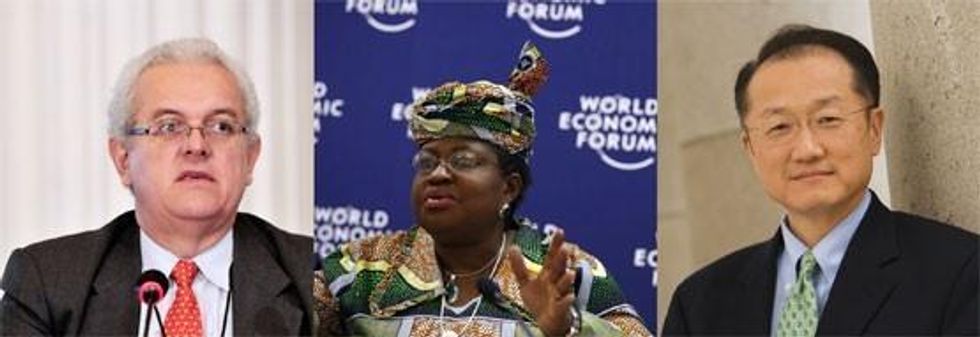Over the past week, there has been a small revolution in a part of the universe of the elite, and the collective actions of citizen groups deserve some credit for it.
The venue is the World Bank, an institution set up after World War II to promote economic growth that has been twisted over many decades to become a lever of banks, corporations, politicians, and technocrats pushing a 1 percent agenda of deregulation, privatization, and trade and investment liberalization.
Since the Bank's beginning, the United States has been able to choose the Bank's president, thanks to a gentleman's agreement with European governments that allows the latter to select the head of its sister institution, the International Monetary Fund. This informal arrangement lasts to this day--although a few years ago, the Bank board set up a process whereby any country could nominate a candidate for the top job.
With these two nominees, the pressure was on Obama to go beyond conventional candidates. And, to his credit, he did.
In February, the current Bank president--free market fundamentalist Robert Zoellick--announced he would not seek re-election when his five-year term ends on June 30.
Immediately, speculation turned to whom the Obama administration would choose as its candidate. Names like Larry Summers, Hillary Clinton, and John Kerry began to leak out. Citizen groups were quick to launch online petitions against Summers, reviled for (among other things) his promotion of reckless financial deregulation, derogatory statements toward women, and devaluation of the environment in poorer countries. Tens of thousands signed on.
At the same time, development economist and prominent UN advisor Jeffrey Sachs declared his desire to be nominated, and he gathered endorsements from eight developing countries around the world. The Nation gave us a platform to debate Sachs about his candidacy and many others joined in on both sides over the past two weeks. We argued that it was time to end the U.S. monopoly on the Bank presidency; we looked to civil society groups to put forward the highest caliber candidates from the global South. While we argued that Summers would be a terrible candidate, we also critiqued Sachs' record, including his Millennium Villages project that supports climate-damaging chemical agriculture instead of sustainable alternatives.
Many were depressed about the prospects of a campaign between two white men from the United States: Sachs versus either Summers or some other conventional pick from the Obama administration.
But behind the scenes, Southern governments were involved in weeks of their own deliberations. On March 21, two days before the deadline, Brazil indicated it would nominate Jose Antonio Ocampo, a former Colombia government and UN official, and a critic of free-market policies. Ocampo was one of 100 economists to sign a letter initiated by the Institute for Policy Studies and the Global Development and Environment Institute at Tufts arguing that governments should have the flexibility to use "capital controls" to reduce economic vulnerability and prevent financial crises.
Three African governments nominated Nigeria's female finance minister, Ngozi Okonjo-Iweala--a conventional free market supporter with ample World Bank experience on her resume (including as a "managing director," one of the Bank's top posts).
With these two nominees, the pressure was on Obama to go beyond conventional candidates. And, to his credit, he did. On Friday, he gave his nod to Jim Yong Kim, the Korean-born president of Dartmouth College, who ran the World Health Organization's creative HIV-AIDS program and co-founded the effective health nonprofit Partners in Health with Paul Farmer. Kim is a doctor and PhD in anthropology with practical experience in helping the poorest of the poor. Interestingly enough, upon the announcement of Kim, Sachs withdrew from the race and stated his strong backing of Kim.
Ocampo has the worldview and smarts to turn the World Bank away from blind adherence to the free market, and Kim could lead it toward practical solutions for the poor. There is much we do not know about each of the candidates--notably, what they propose to do as Bank president. This includes such specifics as to what extent they would address the Bank's sorry record on climate change, sustainable agriculture, and prioritizing partnerships with corporations over respect for unions and civil society. Yet, progressives are in the unprecedented position of having two candidates in Ocampo and Kim who have broken the 70-year mold of blind support of the free market with little knowledge about the lives of the poor.
We have roughly four weeks until the Bank board will choose from among the three at their late April meetings in Washington. But this decision should not be left solely to government representatives. A number of us across the globe hope to assemble questions to put before all three. We should encourage open debate among them. We should also use our voices to influence our governments, and encourage European governments to reject their traditional blind support of the U.S. candidate, looking carefully at all nominees instead. And we should support other ways to turn a still opaque and undemocratic selection process into an open and democratic one.
As we do this, we should celebrate the fact that civil society has helped break the monopoly of white U.S. men with destructive and outmoded free-market ideologies leading the World Bank. Breaking the monopoly at the top may not be enough to transform the World Bank into an institution for the 99 percent, but it is a critical first step.
This work is licensed under a Creative Commons License

